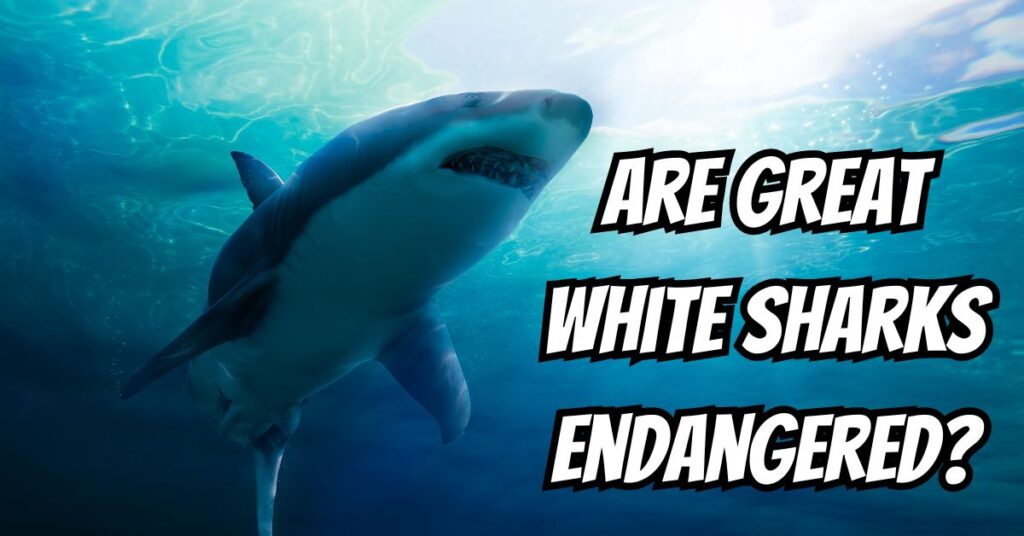
Table of Contents
Are Great White Sharks Endangered?
The great white shark, (Carcharodon carcharias) is arguably the most infamous and feared shark in the world. As an apex predator that sits at the top of the marine food chain, it captures our imagination and dominates pop culture. From the classic movie Jaws to more recent hits like The Shallows, the great white has secured its place as the villain of the deep.
I don’t know about you, but when I ever swim in he ocean, that classic music always pops into my head.
But beyond its fearsome reputation, the great white shark is just another marine animal trying to survive in its natural habitat. And that habitat is increasingly under threat. Pollution, overfishing, habitat loss and climate change are all impacting global shark populations, including the great white. So are great white sharks endangered? Let’s dig in and find out!
The Complex Conservation Status of Great Whites
The conservation status of the great white shark is complex. On the one hand, great whites have been listed as “Vulnerable” globally by the IUCN Red List since 1996. This means that while the species faces a high risk of endangerment, it does not currently meet the criteria to be classified as “Endangered” or “Critically Endangered.”
Regionally, however, some great white populations are in more dire straits. For example, great whites in the Northeast Pacific fall under the “Endangered” designation. Other local great white populations around the world are also struggling more than the global population overall.
Why are some great white regional groups in worse shape than others? In general, coastal shark populations near dense human activity face more stressors than sharks living in remote areas.
Fortunately for the species overall, great whites are found in waters all across the globe, which buffers the species from extinction.
Key Threats to Great White Survival
While great white sharks are still holding their own in remote corners of the world’s oceans, threats to their future persist nearly everywhere they swim. Here are some of the biggest risks:
Overfishing
Despite regulations, illegal commercial fishing still ensnares far too many great whites in nets and on hooks meant for other fish. Their slow reproductive cycles make great whites vulnerable to overfishing.
Bycatch
Great whites unintentionally caught in legal fisheries as bycatch suffer the same fate as their illegally hunted kin. Tuna and swordfish longlining poses a particular bycatch threat.
Habitat degradation
Coastal habitat loss, pollution, and human activity pressure coastal great white populations the most. Climate change also threatens their habitat.
Finning
The horrible, barbaric practice of shark finning claims the lives of millions of sharks worldwide. Great whites are among the species targeted for the shark fin soup trade.
Reputation
Their reputation as a dangerous predator continues to undermine conservation efforts as fear trumps facts. Myths about the threat posed to humans persist despite evidence to the contrary.

Lack of data
Our limited understanding of highly migratory and naturally elusive great whites also handicaps conservation initiatives. We simply need to know more about their movements, behaviors, and population numbers.
Promising Signs for Great White Shark Conservation
While great whites undeniably face an uncertain future, promising steps towards their conservation are emerging:
Legal protections
Great whites now enjoy legal safeguards from hunting and finning in many countries, with more nations joining the protective ranks every year.
Sanctuaries
Marine protected areas provide refuge from fishing pressures and human activity for regional great white populations around the globe.
Public awareness
Outreach campaigns centered on great white conservation are succeeding at reshaping public attitudes to be more fact-based and empathy-driven, rather than how they are depicted in movies.
Research initiatives
Expanding shark research projects are building a foundational scientific understanding of great whites to inform future conservation strategies.
Eco-tourism
Responsible shark cage diving operations provide close great white encounters without harm, giving people an appreciation for the species.
The conservation community agrees that the outlook for great whites would be far more dire without these interventions. But continued action is critical to prevent regressing towards a much darker future.
The Great White’s Vital Role as an Apex Predator
Conserving great white sharks is about more than just saving an iconic species. As apex ocean predators, great whites play an integral role in maintaining healthy marine ecosystems.
From regulating prey populations to scavenging dying whales, great white feeding habits provide essential ecological services. They help structure food webs and nutrient cycles in the habitats they roam through. Simply put, great whites are keystone species in the areas they inhabit.
Losing great whites would diminish biodiversity and create trophic cascade effects. The ecological ripples would impact many other marine animals. Protecting great whites ultimately safeguards entire ocean environments.
A Hopeful Future for the Lords of the Sea
The challenges facing great white sharks are undeniable. But the will to save these magnificent animals has never been stronger. With continued action on multiple conservation fronts, great white populations can stabilize and recover.
Of course, true success will require patience. Great whites are slow-growing, long-lived fish. They take over a decade to reach sexual maturity. Positive population trends will emerge gradually over years, not months.
Ultimately, the fate of the great white shark remains in human hands. If we treat them as monsters to be feared, they just may go the way of monsters and fade into myth. But if we respect great whites as fellow inhabitants of our blue planet and guardians of our oceans’ health, their future seems bright.
Great whites have swum Earth’s seas for millions of years. Here’s hoping these lords of the sea can continue their ancient legacy for millions more, reminding us of nature’s wonder, power and fragility. With wisdom and stewardship, we can secure the great white shark’s rightful place in our world for generations to come.
Be sure to watch our 10 facts about great white sharks video for more about these amazing animals.
